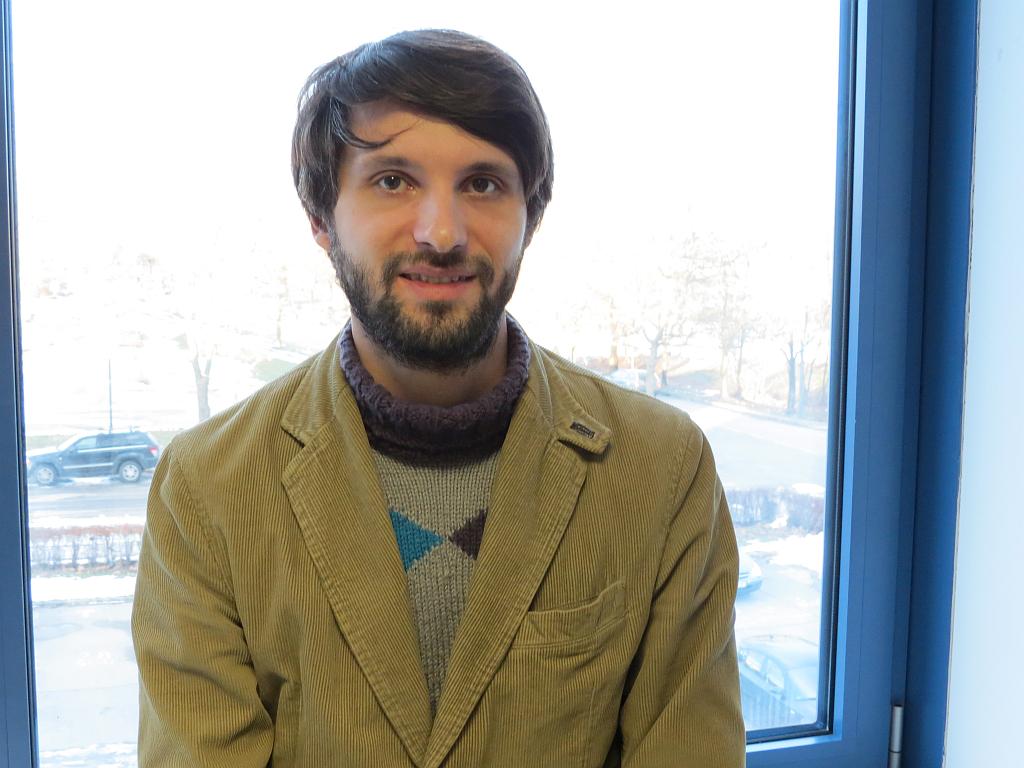

"
In the beginning of December 33-year old Luka Zevnik became one of the ten researchers at the Ljubljana University who received the awards for the most outstanding University Ljubljana achievements in 2014. He was awarded for his book Critical Perspectives in Happiness Research: the Birth of Modern Happiness, published by the reputable international publishing house Springer; the book was well received all over the world. Zevnik, working also as an assistant professor and researcher at the Department of Cultural Studies of the Ljubljana Faculty of Social Sciences, has introduced a new approach into the research of happiness. He presented happiness as a historically and culturally instated idea and experience which is not universal, but in its basic form characteristic only for the western world, and he was the first to introduce critical aspects in the research of happiness.
During the festive season best wishes could be heard everywhere: "Happy New Year!" People shower each other with wishes for happiness, although nobody really knows what that is. What did you wish to your family, friends and acquaintances for the year 2015 – happiness, or something else?
That's a good question. Happiness became a much-hackneyed word; actually we don't even know what exactly it should express, therefore my wishes (besides happiness) were more oriented towards creativeness, innovativeness, and serenity. I believe creativeness and innovativeness are connected with happiness. I must emphasize that in my book happiness is the research object, as a cultural-social phenomenon, and I try to understand the source of the idea of happiness.
My personal understanding of happiness is a different thing – personally, I consider quest for happiness a simultaneous experiment and experience, what the French would call expérience. For me quest for happiness is a kind of experiment a person makes in his or her own way, and strives for his or her own ideal, being more or less successful at this experiment. But in order to succeed we must be creative, we must be able to think outside the set boundaries, and have courage to try different things in our life. A quest for happiness is thus an individual project for every individual person, but at the same time it should be known that a quest for happiness occurs within the cultural-social context which defines the basic parameters of the possibility for happiness, and defines happiness itself. The topic of my book was the understanding of these parameters, and where they came from.
Your book has been described as "a pioneer work in understanding of the basic characteristics of the modern experience of happiness, considered by the western individuals as self-evident". Is this topic widely researched in academic circle, or are you breaking the new ground?
The study of happiness has been becoming more and more established since the 70s of the 20th century. There is even a special academic field dealing with this topic – the Happiness studies. The measuring of happiness is becoming more and more widespread within that frame, and the ideas that happiness as a measure of the development of societies should start replacing single dimension indicators, as eg. GDP, is becoming more and more pronounced. The research of happiness has lately become widely spread all over the world, which is the reason my book was so successful.
While most of the researches deal with the measurement of happiness, my book is the first in-depth scientific analysis of the source of happiness, and is explaining the origin of the idea of happiness in the western world. The basic findings have shown that, in spite of the impression that the idea of happiness has been present since ever, it is in fact a modern invention which only occurred in the 17th and 18th century in the western culture. The idea of the modern happiness occurred at that time. The ancient Greeks did know similar concepts, but the book explains that we should not translate those uncritically as happiness, as their ideals and experience were completely different, people lived in a different manner.
The second thing which makes my book original is the fact that it is introducing a critical perspective into study of happiness. Until now it was treated, both in science and in general, as something positive, which can't pose a problem. But we should mention at least three problematic aspects of happiness: as first, happiness and similar ideals can be used and misused as the mechanism of governments, and social control, which has regularly happened in history.
The second aspect speaks of the "regime of happiness" - the dominant regime, a general perspective of what happiness actually is within a certain society. The problem with that is that certain segments of society, or even entire states, are excluded from the dominant regime of happiness, and often the dominant regime of happiness is preserved based on the excluded. Here we could mention exploitation of certain countries for obtaining raw materials in order to allow the rich West to preserve its dominant regime of happiness.
And the third critical aspect is the forced happiness – a standard of a modern society, demanding from us constant happiness, and giving us the impression that there is something wrong with us when we are not happy, and forcing us to strive for happiness all the time. A good example is the function cameras have, which makes a snapshot at the moment we smile; there is also a number of articles in magazines and self-help manuals reminding us that we should be even happier. Forced happiness brings another problem, and that is the fact that we never know whether we are happy enough at the moment, and that we should be happier still; the feeling that something is missing is constant.
Lately you have been trying to turn neuroscience into more applicative purposes. You are a cofounder of Blackbox company dealing with applicative neuroscience.
The book on happiness is very basic, and answers the basic, general questions on happiness, but I believe that scientific-academic sphere should come out of its ivory tower and transfer the findings from the research sphere to practical fields, into economy, for Slovenia's sake. Slovenia is a very small country, and we won't learn to use the knowledge we have, interconnect, and produce advanced and innovative things, we will be left at the periphery of the world. I had the opportunity to see first-hand such development orientation at the Australian Universities, where I completed a part of my doctoral study.
As a derivation of our application for a larger European research project, in which we have in an interdisciplinary way merged a number of methods including neuroscience, we have founded a society for applicative neuroscience BlackBox, dealing with technologies for measuring brain activities which we are trying to apply to several areas. By measuring brain activities it is possible to establish, with great precision, positive and negative emotions – satisfaction, well-being and happiness in connection with certain stimuli.

































































